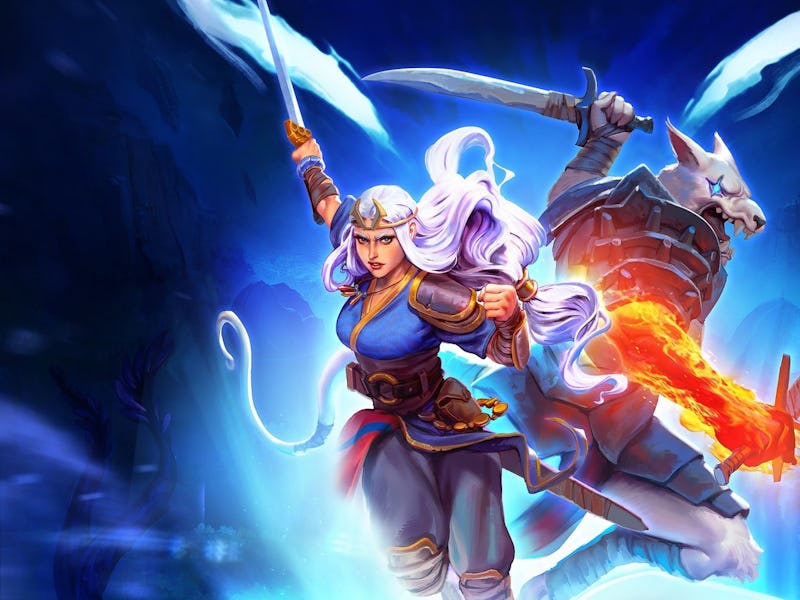The Best New Strategy Game on PS Plus Is A Genre Mashup With Gorgeous Storybook Art
Get lost in a good book.

Books are dangerous. Don’t trust them. At least, that’s the message I got from Roguebook, a deckbuilding roguelike that just landed on PS Plus, but maybe its challenging campaign taking place in a cursed tome has made me afraid of books. Even with more great deckbuilding card games in the world than I can even keep track of, Roguebook is full of enough clever twists to make it worth a run or ten.
Fans of card games will know something of Roguebook’s pedigree even if they haven’t played it. Roguebook comes from Abrakam Entertainment, developer of the exquisite strategic card game Faeria, and Richard Garfield, creator of Magic: The Gathering. Roguebook wears its developers’ inspirations on its sleeve, blending the hex-based world exploration of Faeria with the tense card duels of Magic, while still feeling like it’s blazing its own trail.
Roguebook’s hex crawl elevates it above its siblings in the deckbuilding roguelike genre.
At the start of Roguebook, you’re told you’ve been trapped inside a book (don’t trust them!) and you need to fight your way to its papery heart to get out again. Before you get into the business of card battles, you find yourself on a world map divided into hexes, most of which are left blank. Using a handy assortment of inks and brushes, which you can earn more of through battle, you uncover what’s hidden behind those blank hexes, be it gold, a random card, a story event that offers powerful rewards, or a fight.
This exploration layer becomes a careful game of strategy, as you must ration limited supplies to get the best rewards on the map before facing the boss. Fighting more enemies gets you more chances to uncover something good, but it can also sap your health, setting up a crushing defeat with the map’s big bad. Aside from that, uncovering the map is just plain fun. Taking a shot in the dark and unlocking a rare relic or a row of hexes all filled with gold will give you a leg up in battle and tickles a similar part of the brain to the one that lights up when you win a fight and get a particularly juicy card draw as a reward.
Four characters with distinct abilities help make every Roguebook run feel fresh.
I’ve played quite a few runs of Roguebook, and I’m still faced with hard choices every time. Do I try my luck in one more fight to get another vial of ink? Should I draw a path to that healing item, or strike out into the inkless void and hope there’s something better there? Getting the most you can out of your limited resources is a fun challenge before you even enter combat, where things really kick off — and where Roguebook’s fairy tale aesthetic really pays off with some incredible hand-painted character art.
To start each run of Roguebook, you choose two party members from a cast of four characters, two of which you unlock through gameplay. Each character brings their own deck of cards and abilities, specializing in damage, defense, healing or some combination of all three. The wolf-man Seifer, for instance, has a toolkit that includes sacrificing your own cards and taking damage to fuel bigger hits.
Roguebook’s lush artwork shines during its card battles.
In battle, your characters stand one in front of the other, with the lead character taking all the damage from attacks. Manipulating their position is a key part of Roguebook, letting you decide who takes the hits, and many cards offer further bonuses like damage boosts for swapping positions. Learning when to switch places is a key part of your strategy in Roguebook, and characters can play off each other in other interesting ways, too. Any combination of characters can be viable, and finding ways to form unexpected strategies by combining their decks’ strengths is a real joy.
The repetitive structure of roguelike games is what makes them so easy to play round after round, but it can also get boring to do the same thing so many times. I haven’t put as much time into Roguebook as I have into games like Slay the Spire, so I can’t say how that will shake out in the long term, but after half a dozen runs in, I’m still finding reasons to go back. There’s enough variety in card decks to keep things feeling fresh, plus the game’s hex exploration means you’re truly never seeing the same world twice. Whether you’ve already had your fill of other deckbuilders or are a newcomer to the genre, Roguebook’s mix of solid card battles with unique world exploration make it worth getting lost in.
This article was originally published on